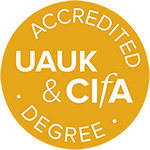Current filters applied:
- (-) Remove Current Projects filter Current Projects
- (-) Remove Computational and Quantitative Archaeology filter Computational and Quantitative Archaeology
- (-) Remove Environmental Archaeology, Geoarchaeology, and Landscape studies filter Environmental Archaeology, Geoarchaeology, and Landscape studies
Displaying 6 projects
The 10th-5th centuries BCE (the first centuries of the Iron Age) witnessed significant societal transformations across the Mediterranean. Populations grew in many regions, the first genuine economic integration of the basin occurred through maritime interaction and overseas settlement, and, for the...
ENCOUNTER investigates the Jomon-Yayoi transition, a demic and cultural diffusion event that led the predominantly hunting, gathering, and fishing-based communities of the Japanese islands to adopt rice and millet farming during the 1st millennium BC.
This archaeology-led initiative focuses on the East Anglian Fens, an extraordinary landscape where exceptional preservation of organic artefacts and environmental evidence gives unparalleled insights into the last 5,000 years of communities, resources and habitats. The Fens are the richest and most...
The Mapping Archaeological Heritage in South Asia ( MAHSA ) project, now in its Phase 2, will continue to document the endangered archaeology and cultural heritage of the Indus River Basin and the surrounding areas and publish this information in an Open Access Arches geospatial database. Over the...
SILKGLASS is a Horizon Europe MSCA-PF fellowship funded by UKRI and hosted by the McDonald Institute for Archaeological Research, University of Cambridge. Central Asia is traditionally seen as a passive Silk Roads throughway rather than an active and creative node. SILKGLASS seeks to investigate...
PersianTRAIL is a research project using Geographic Information Systems (GIS), Remote Sensing (RS), and historical-archaeological data to reconstruct the Persian Royal Road (PRR), a key infrastructure of the Achaemenid Empire (6th–4th century BCE). The project examines factors like topography...


